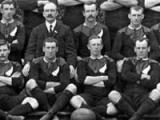What happened that day?
See historic events for any day of the year by entering the date below. Why not try your birthday?
Kiwi of the Week
Today in History

1905 All Blacks' 'non-try' hands Wales historic win
A great rugby rivalry was born when a last-minute try to All Black Bob Deans was disallowed, handing the Welsh victory. The incident remains a source of debate amongst rugby fans of both nations.
The Welsh hero that day was wing Teddy Morgan. His try ten minutes before halftime saw a crowd of 47,000 at Cardiff Arms Park erupt with joy. For Welsh fans this game was memorable for the staunch defence of the home team. For All Blacks fans it will always be infamous for Deans' ‘try’.
This game was part of New Zealand's first fully representative tour to the Northern Hemisphere. The team, known as the 'Originals', popularised both the haka and the 'All Black' nickname. The loss to Wales was their only defeat in 35 matches. One newspaper described the game as ‘the hardest, keenest and most vigorous contest ever waged between two representative teams on the football field.’
Following a sustained period of attack late in the game it was claimed that Deans had grounded the ball over the try line, then dragged back into the field of play by Welsh defenders before the referee arrived. In the absence of television replays, there was little the Scottish referee, John Dallas, could do. In a manner not dissimilar to the All Blacks' defeat in the 2007 World Cup, some blamed the referee. While All Black player Duncan McGregor noted laconically that ‘the referee was not too good’, manager George Dixon was more critical: ‘No referee who is commonly 30 or so yards behind the play ... can be classed A1’.
Deans was adamant that he had scored, and said so in a telegram to the Daily Mail:
Grounded ball six inches over line. Some of Welsh players admit try. Hunter and Glasgow can confirm. Was pulled back by Welshmen before referee arrived.
Others blamed defeat on the effects of a long tour. By the time the All Blacks reached Cardiff they had been away for 139 days. The New Zealand captain, Dave Gallaher, accepted defeat in what he described as a ‘rattling good game, played out to the bitter end’. He concluded with the well-worn sports cliché that ‘the best team won’.
The Welsh media was ecstatic. The Western Mail declared: ‘One can imagine every Cymro (Welshman) in New Zealand holding his head higher than ever.’ The South Wales Daily News declared that ‘there has never been a Welsh side which, from forward to fullback, showed such uniform excellence as the 15 men whose names will live as having defeated the hitherto all-conquering New Zealanders.’
The increasing dominance of the All Blacks in encounters between the two teams has seen the significance of the moment fade. Wales won three of its first four matches with the All Blacks, the last of these victories coming in 1953. The All Blacks have won all 20 subsequent matches with Wales. The closest recent encounter was a 26-25 nail biter in Cardiff's Millennium Stadium in 2004.
Image: 1905/06 All Black team (DNZB)














